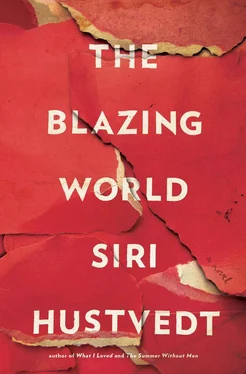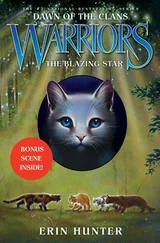I think it was my stories of Baaltamar that seduced Harry. The imaginary world disappeared about the same time as my seizures, as did the all-seeing God of the Hebrews, but I have kept a tender feeling for people who speak in tongues and for Mama, who never turned away from me, despite the fact that I wandered into a secular wilderness and never returned to the fold. When I arrived at the lodge, Harry was tending to her own characters, a group of stuffed figures — cold, coolish, warm, and hot. I became fond of her “metamorphs” (as Harry called them), even though a good number of them were injured or deformed. I take that back. I liked the hurt metamorphs most, the ones with missing legs and arms, with braces and slings, humps, or rashes painted on them. They did not look real, but they felt more human than a lot of humans I know, and Harry was gentle with her homemade critters. Sometimes she’d make them talk for little Aven, who was just four at the time and used to visit “Gran” on weekends and leave wet spots all over the art from her kisses.
My route to the Red Hook lodge was circuitous. After college, I journeyed to New York City along with legions of fellow aspirants to become a thespian and ended up as a waiter. “Hi, I’m John Whittier. I’ll be your waitperson this evening.” That was the era of broken plates, rude customers, auditions, callbacks, rejections, more rejections, and a few measly parts for a freckle-faced, light-skinned black man who can do any and all accents on request. Auditions are one thing. Auditioning for parts in plays and movies that are so badly written, so poorly conceived, they give you indigestion is another. I decided to write my own material and became a performance artist, Phineas Q. Eldridge, an impoverished one, I’m afraid. I had been dumped by my beau Julius and had fallen from the semisplendor of a Chelsea apartment to my friend Dieter’s couch (a kind of a gutter, as it turned out, with gum wrappers, toothpicks, dust fuzz, and nickels between the cushions).
It was Ethan Lord who came my rescue. My act at the Pink Lagoon had been featured in the Neo-Situationist Bugle , probably the most obscure publication in all of New York City, but Ethan and his friend Lenny cultivated performances like mine for reasons that only a few people in university graduate departments understand. They did not approve of capitalism. This was well before the 2008 smash-up, and shopping was still the national pastime. Of course, the two subversives didn’t appreciate the joys of a brand-new toaster or the feel of a cashmere scarf or what a dab of extremely expensive cologne can do for you psychologically . They were strict, strictly secondhand, thrift-store, vintage boys. It was a matter of principle but also of perversity, one that comes more easily to rich people than to the rest of us. Ethan had a trust fund. Lennie did not, but I gathered that his parents sent him monthly checks.
Despite the fact that the boys were straight, they were advocates of “queer theory,” which was not only for or about homosexuals but could be applied to all manner of persons and things. The point was to “bend the categories.” I was all for that, of course, and they were an earnest, touching pair. Lenny reminded me of an anarchist from the thirties with his round wire-rims, and Ethan, with his large eyes and dark curly hair, seemed to be hiding a sense of humor somewhere, although I wasn’t sure where. When I first met him, he spoke to me about how my act “embodied disruptions of normativity.” They were disruptions lifted directly from my own life. I played versions of my parents, whom I called Hester and Lester, and I played Letty as Hetty, when she was a wild tot and as her grown-up, serious engineer self who doesn’t approve of the fact that I robbed our family story for the theater, and I played my old-soul, epileptic, little-boy self and Sister Eleanor in the grip of her tongues, but always with comic distance, and I did it in costume, cut in half, black and white, man and woman — but the boys were right: By the end of the show all the neat distinctions between one thing and another had gone queer.
Ethan wanted me to meet his mother: waif saver of the universe. I came preapproved because I was technically homeless and because the Bugle had turned H/Lester into a “theoretical construct,” and this had impressed the rag’s nine readers, one of whom was Harry herself. A few days before I met Ms. Burden for the first time, there had been an uproar at the Red Hook lodge. One of Harry’s waifs, named Linda Lee, whose “art” involved cutting her body and taking photographs of the damage, overcut herself in the hallway of the resident artists’ wing and was rushed to Methodist Hospital, where she was patched up, shipped to a psychiatric ward for a week, and then sent home to her mother in Montclair. Apparently, Harry had not understood that the girl’s artistic impulses involved real blood. Ethan might have had his head in cumulus formations, but, as he put it, his mother’s “charitable impulses had to be curbed before disaster struck twice.” He also told me that “one insane person was enough in the place”—a reference to the Barometer, whom I came to know and tolerate.
In short, that is how I assumed the role of master of ceremonies at the Red Hook lodge. Harry had not been paying attention. I told her that she couldn’t take in any piece of trash that came begging at the door. This wasn’t a crib for impoverished tourists, nutcases, slatterns, and junkies, was it? We needed bona fide artistic types who would stay awhile and do some chores. The Barometer was already dug in, and Harry was stuck on the man, whom she believed to be harmless, which he was, mostly, except that he did not wash. It was Maisie who convinced him that a weekly immersion in the tub with a bar of soap was the price he had to pay for his living quarters. Maisie was a sort of specialist in insane people, and she went on to make a film about him called Body Weather , which won a prize at a film festival. I also discovered that the Medeco key to the front door had been copied by a cabal of lost boys and girls who came and went in the night. I changed the lock.
I took over the excommunicated Linda Lee’s spaces and, after posting a sign that read NO ROOMS AVAILABLE, I started the informal application process for artists in need. I decided there was space for three to live and work in the building besides Harry, and since the Barometer and I were already there, we had room for one more resident. We settled on Eve, a flamboyant character born and raised in Idaho, twenty-five years old and a seamstress of force. She moved in with her Singer and sewed up a circus of artworks that Harry and I both thought were adorable. Eve didn’t stay long. Ulysses, a sculptor in the minimalist tradition, followed, and then came Delia, who worked exclusively in old-shoe installations (my favorite). I created the minimal rules and regulations — no littering on-site; excessive noise after eleven p.m. strictly forbidden; love objects welcome but absolutely no sexual business transacted on site (not a problem anymore, but as a prohibition it gave us some chuckles); presence required once every two months to show and discuss finished work or work in progress. We hired a weekly cleaning team to roar through the two floors of the building, divvied up some domestic jobs, and the lodge was civilized.
But you want to know how it happened, the story between Harry and me. Well, it didn’t happen fast. It crawled up on us. We rented movies on Sunday afternoons, mostly oldies Harry had never seen: Busby Berkeley extravaganzas for their kaleidoscope visuals— Footlight Parade, Gold Diggers, Forty-second Street ; some Rogers and Astaire; and the old films for Negro audiences only: Cabin in the Sky and Look-Out Sister , and Harlem Is Heaven with the Jangler — Bojangles, “Everything’s Copacetic,” the “Dark Cloud of Joy,” born Luther-in-Richmond-Virginia-Robinson, who danced up on his toes, precise rhythms, perfect tones — and Stormy Weather with Robinson again, some faux version of his life with Fats Waller, Cab Calloway, Lena Horne, and the oh-my-god-I-can’t-believe-how-well-they-can-dance Nicholas Brothers. I started tap lessons at four and could impress Harry with some shuffle-ball changes and skating moves, but I never had the real stuff. Lester does a little soft shoe in my show, and it always goes over pretty well. Harry called the Sunday movie our “cozy time,” and she liked to put on what she called “soft clothes” or “nearly pajamas” for the occasion and make popcorn. Then we’d sprawl and laze in front of the TV. We were not always alone. Other members of the lodge joined us from time to time. Bruno, Eve, or the Barometer, who wandered in and out or brought his sketchpad to the sofa and drew.
Читать дальше












